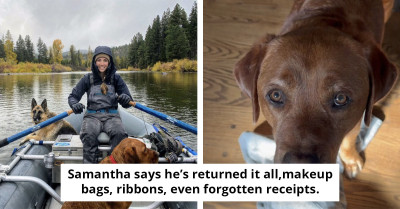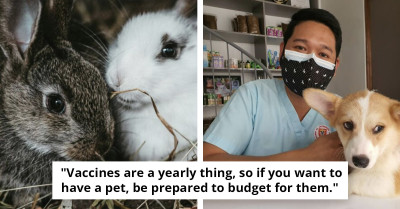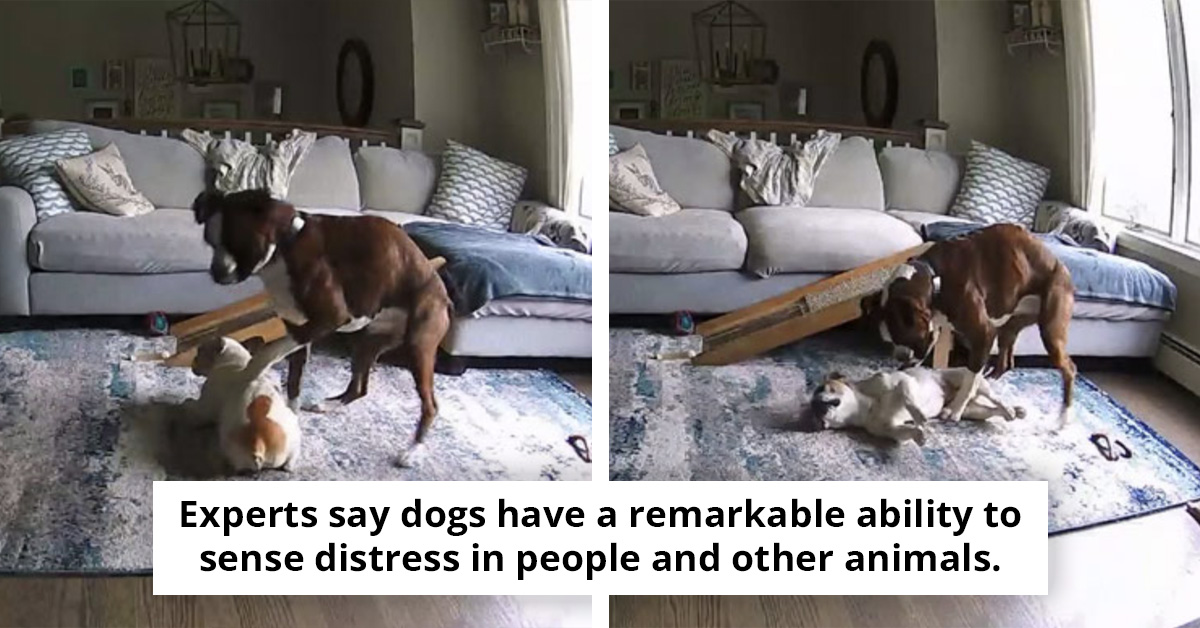Woman Calls Host “Cruel” For Refusing To Lock Her Cats In A Car During A Hurricane
When disasters strike, they tend to strip everything down to instinct — who rushes to help, who opens their home, and who decides that kindness comes with conditions. After Hurricane Beryl tore through the area, one woman became a lifeline for her friends who’d lost power.
She had electricity, running water, and a dry place to sleep. It should have been a story about community and compassion, the kind people like to tell when the world feels heavy. Instead, it turned into a bitter argument about who truly deserved comfort — and how far generosity should go.
At first glance, it seems simple: if someone needs help, you give it. But real life tends to blur those lines, especially when allergies, pets, and personal boundaries enter the picture.
Emergencies don’t erase differences or sensitivities; they magnify them. A single choice meant to keep everyone safe can suddenly feel like a personal slight. What one person calls “reasonable,” another might call “cruel.”
This story from Hurricane Beryl isn’t just about a cat or an allergic guest. It’s about the quiet tension between doing good and being good in someone else’s eyes.
Even when intentions are pure, there’s always someone ready to question what kindness should look like — and how much of yourself you’re supposed to give.
After Hurricane Beryl hit, she opened her home to friends who lost power, thinking it was the kindest thing to do.
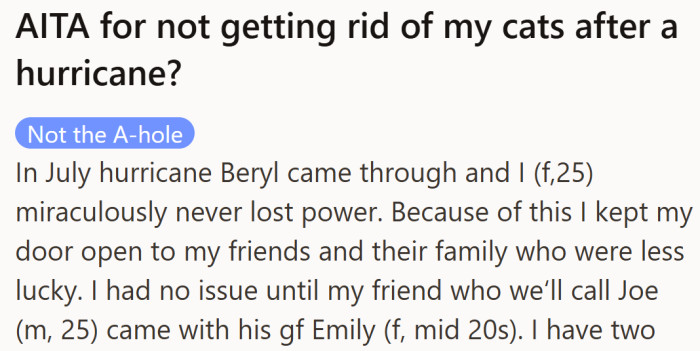
Her cats were harmless, friendly, and adored attention — but one guest’s allergies turned that into a problem.

It all seemed handled — a few sniffles, a cooperative cat, and a guest too kind to complain. For the moment, at least.
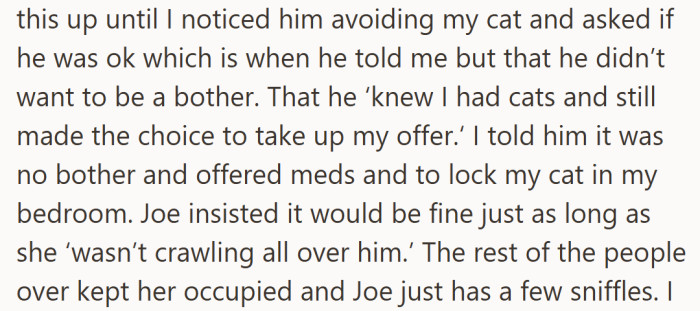
Animal Welfare Considerations
Dr. Patricia McConnell, an animal behaviorist, emphasizes the importance of understanding animal stress during emergencies. She notes that pets experience fear and anxiety in unpredictable situations, such as hurricanes.
Her work indicates that keeping pets in a safe and familiar environment helps reduce panic and distress. McConnell advocates for having a disaster plan that includes pets, as this not only ensures their safety but also enhances the owner's peace of mind during crises.
Dr. Jane Goodall encourages communities to develop support networks during disasters, particularly focusing on animals. She believes that collective action can create a stronger safety net for both people and pets.
Goodall suggests organizing community workshops that emphasize animal welfare during emergencies. These workshops can educate pet owners on disaster preparedness and promote a sense of shared responsibility, which can ultimately enhance community resilience and compassion.
What started as a lighthearted story about surviving the storm took a sharp turn when Joe joked about the “forbidden cat.”
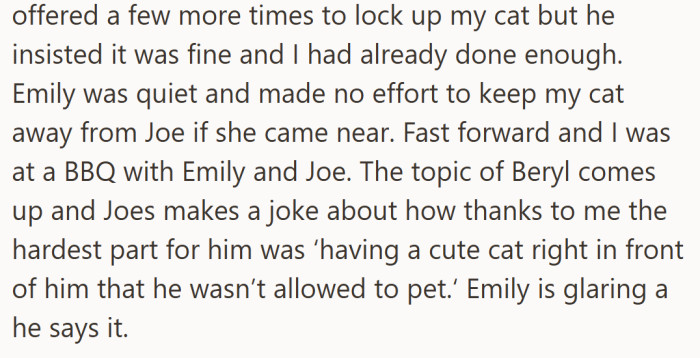
What began as small talk turned explosive when Emily accused her friend of valuing her cats over human safety.
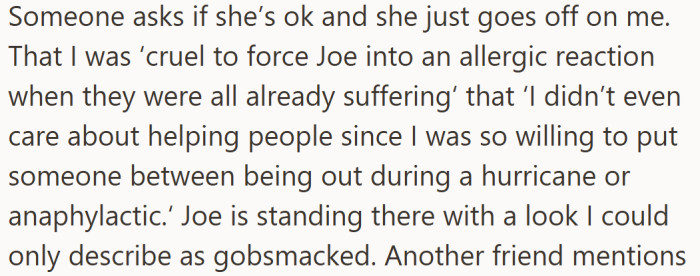
Her friends were stunned when Emily claimed the “gracious” move would’ve been trapping the cats in a car for hours.
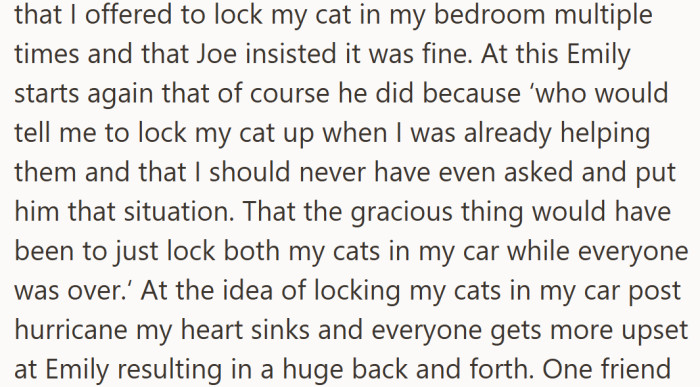
Research shows that animals can perceive changes in the environment before humans do, often sensing impending disasters like hurricanes. This heightened awareness can lead to increased anxiety in pets.
A veterinary professional notes that owners should recognize their pets' behavioral changes during such times. Providing a secure, quiet space for pets can help mitigate stress. Ensuring pets are comfortable and calm during a storm can be crucial for their wellbeing during such chaotic events.
The argument spiraled until Joe finally stepped in, apologizing for Emily and insisting he’d never felt mistreated at all.
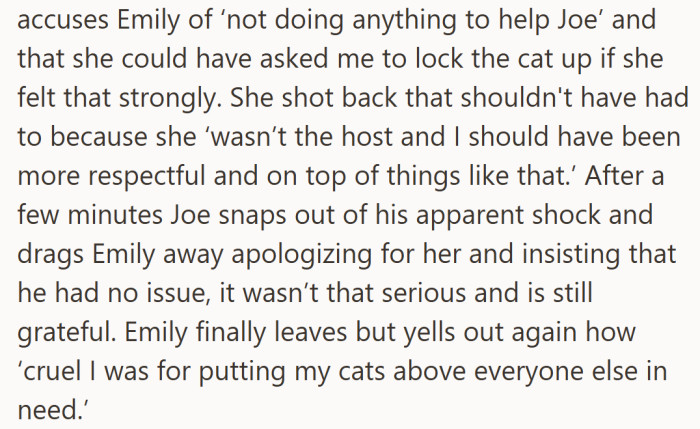
Simple, effective, and feline-approved. Boundaries and fur both stay where they belong.
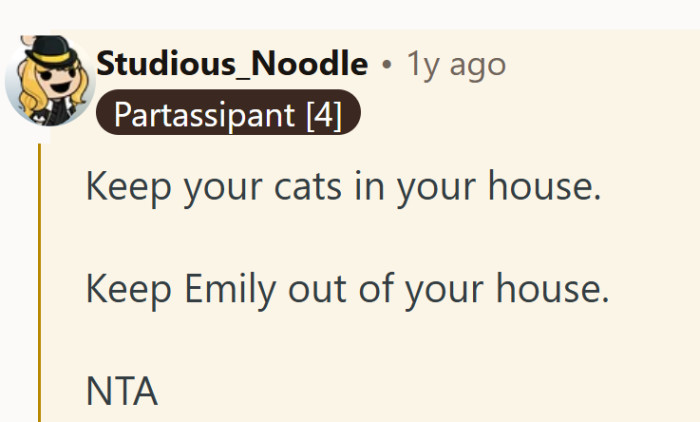
Sometimes the storm doesn’t end outside — it just moves into your social circle.

Practical Disaster Preparedness
Experts recommend that pet owners create a disaster preparedness plan that includes their pets' needs. Dr. John Hattie, an education researcher, suggests practicing emergency scenarios that incorporate pets.
This includes having a designated safe space, necessary supplies, and a transportation plan in place. By preparing in advance, pet owners can reduce panic and ensure their pets' safety during emergencies. Regularly reviewing and updating this plan can help families feel more secure and confident when disaster strikes.
Sometimes the calmest creatures in the room really do have the best instincts.

People can handle storms, but sometimes the emotional weather at home is harder to survive.

It’s one thing to worry about allergies — it’s another to weaponize the vocabulary.
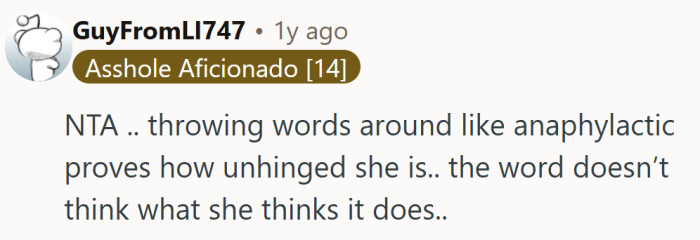
Dr. Jane Goodall, a renowned primatologist, highlights the broader implications of human-animal relationships during crises. She explains that our treatment of animals reflects our compassion and empathy levels.
Goodall believes that fostering a sense of responsibility for all living beings is essential, especially in challenging times. Encouraging communities to work together, especially in caring for animals during disasters, can strengthen social bonds and promote a culture of kindness.
Sometimes being kind is mistaken for not doing enough, but Joe seemed to understand the difference.
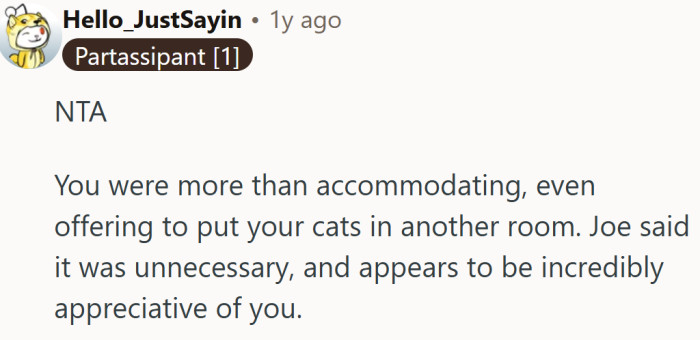
There’s taking things too far, and then there’s suggesting a cat should ride out a hurricane in a car.

It’s one thing to care about someone’s health, but another to speak over them entirely.

The Importance of Compassion
Dr. Dan Siegel, a renowned psychiatrist, emphasizes emotional intelligence in family dynamics, especially during stressful situations like natural disasters. He believes that understanding and managing emotions can lead to healthier interactions.
In the context of the hurricane incident, Siegel suggests that open communication and empathy are vital. By discussing feelings openly, families can navigate challenges together, ensuring that everyone, including pets, feels valued and safe during crises.
When the calmest person in the story is the one with the allergy, it’s clear who the real problem was.
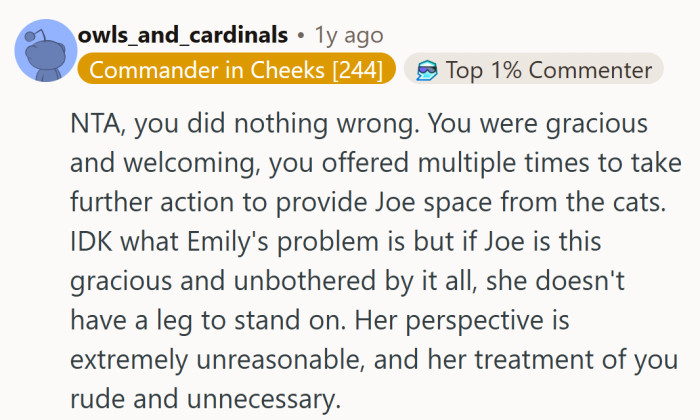
“Snort my Flonase and move on” might just be the new motto for dealing with both cats and drama.
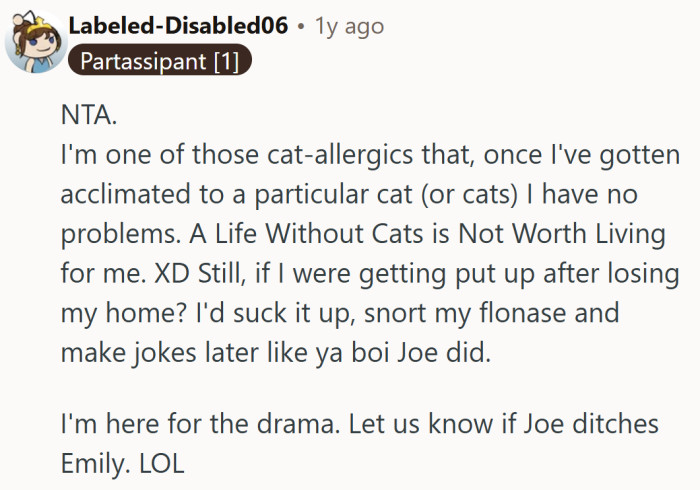
Sometimes humor says what everyone’s thinking, just with sharper claws.
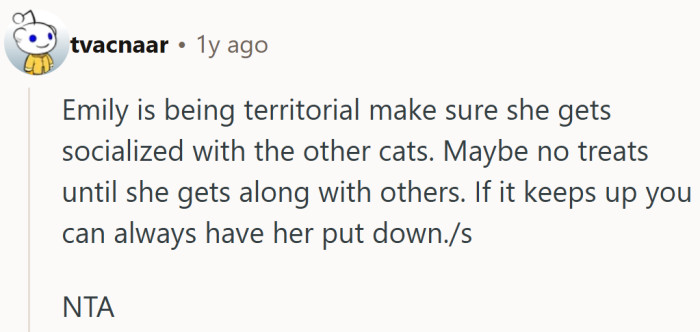
Veterinary experts stress that preparation for natural disasters should include pets as part of the family unit. They recommend having an emergency kit with essential supplies like food, water, and medications for pets.
Additionally, ensuring that pets are microchipped or have identification tags can significantly enhance their chances of being reunited with their owners after a disaster. By prioritizing pet safety, owners can minimize stress for both themselves and their animals during turbulent times.
The jury, the witnesses, and even the “victim” all agreed — Emily was arguing with herself at that point.

Cat people everywhere nodded in approval — the house belongs to the feline, humans are just tenants.
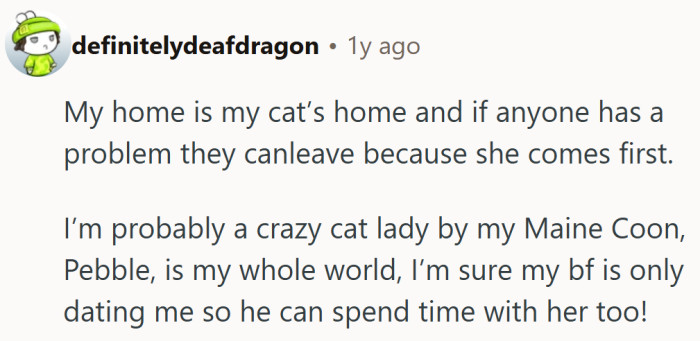
To many, pets aren’t just animals; they’re family. And no friend should ever make you choose between the two.
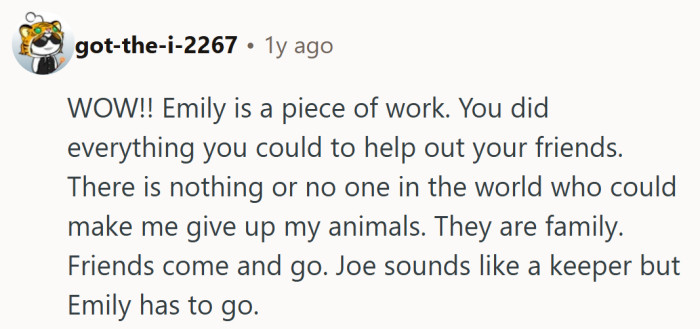
Navigating Community Dynamics
Dr. Harvey Karp, a pediatrician and child development expert, notes that children’s emotional responses during crises can mirror their caregiver's reactions. His research shows that when parents remain calm, children tend to feel more secure.
In the context of the hurricane situation, Karp emphasizes the importance of modeling positive behavior, including empathy towards animals. This approach not only helps children manage their fears but also fosters a sense of responsibility towards pets and other vulnerable beings.
For some, her choice was practical; for others, it was heartless. But when emotions run high and survival instincts kick in, logic tends to fade.
Should a host be expected to sacrifice her own pets for the comfort of guests — even during a storm? Or was the real mistake assuming good intentions could weather every kind of disaster? Share this story with someone who’s ever tried to help and found themselves blamed instead.
Expert Opinion
This situation illustrates how stress and high-stakes circumstances, like a hurricane, can amplify underlying tensions and personal values. People often react based on their own experiences and beliefs—what feels like a reasonable boundary for one person might feel like a betrayal to another. It's a reminder that in moments of crisis, our instincts and emotional responses can overshadow rational thinking, leading to conflict even when intentions are good.In summary, navigating the complexities of caring for pets during disasters requires a blend of preparation, empathy, and community support. Experts like Dr. Patricia McConnell and Dr. Jane Goodall remind us that our interactions with animals reflect our values as a society. By fostering compassion and understanding, we can create safer environments for both animals and their owners during crises.
Ultimately, building strong community ties and effective disaster plans will ensure that everyone, including pets, is cared for during difficult times.

